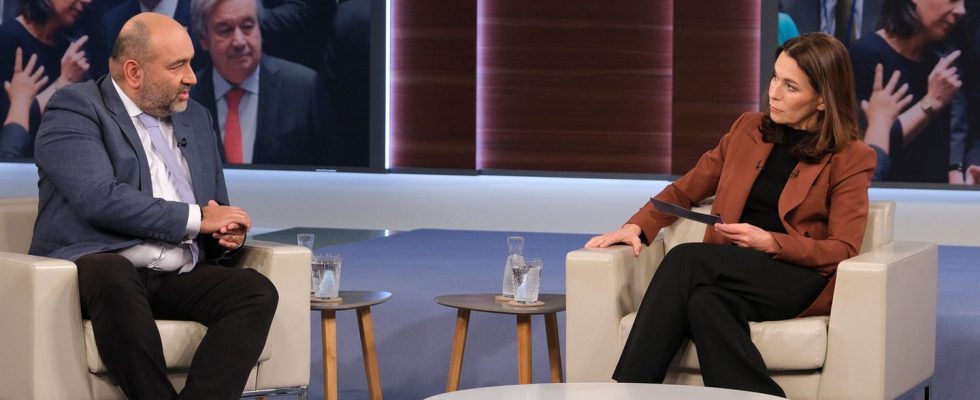Talk at “Anne Will”
What is Germany’s solidarity with Israel, Mr. Nouripour? Green Party leader finds himself in need of explanation
Green Party leader Omid Nouripour in conversation with talk show host Anne Will
© NDR / Wolfgang Borrs
Hamas must be destroyed, Anne Will has no doubts about that. However, there is no clear answer. Until Holocaust survivor Friedländer speaks out.
More than a month after Hamas’ attacks on Israel and the subsequent military operation in Gaza, international pressure is growing on the Netanyahu government. This also breaks on Sunday evening in the talk show host’s Middle East round Anne wants to go through again and again. The guests disagree when it comes to the proportionality of Israel’s defense. But in the end it is Holocaust survivor Margot Friedländer who even evokes emotions in presenter Will with her appeal.
Discuss it:
Omid Nouripour, co-leader of the Green Party
Jenny Havemann, German-Israeli entrepreneur and blogger
Abdul Chahin, comedian, poetry slammer and author
Guido Steinberg, Middle East and terrorism researcher
Carl Bildt, former Prime Minister of Sweden
Margot Friedländer, Holocaust survivor and contemporary witness
There is no doubt about one point in the Will broadcast: Hamas must be dismantled so that both the Israeli and Palestinian people have a secure future. But the practice of this operation is proving difficult these days: while the terrorists are hiding in tunnel systems and among the population in Gaza, according to the local health authority, more than 11,000 civilians have already died as a result of air strikes.
Questions about the proportionality of the Israeli military operation abound at Will that evening, and every position seems to have its legitimacy. This is also what makes the topic so complex. It hardly helps that Will always asks whether Israel is acting proportionately or whether this is even a legal question given the atrocity of October 7th – as if there was a simple “yes” or “no” to it.
Because again and again in the Will show, the human fates behind all those discussions shine through. There is the German-Israeli entrepreneur Jenny Havemann, who lives near Tel Aviv. She reports on Israel’s second war of independence and her son, who is afraid of being kidnapped to the Gaza Strip. But there is also the Palestinian-German comedian and poetry slammer Abdul Chahin, who can understand the defensive instinct of the Jews and still wants more diplomacy.
Will questions Nouripour: Where is German support for Israel?
No wonder that the co-leader of the Green Party, Omid Nouripour, is stumbling a bit with so many gray areas. “The responsibility situation is completely clear,” explains Nouripour, referring to the Islamist terrorist organization Hamas. The Green politician emphasizes that the majority of Palestinians do not support the organization. The federal government is also fully on Israel’s side.
So far so good. But then Will starts: “Then why doesn’t she do it when it matters at the United Nations?” she asks pointedly. The talk show host is referring to the UN resolution on Gaza, in which the member states voted, among other things, on a humanitarian ceasefire and the release of the hostages – and in which Germany abstained.
Nouripour takes refuge in shallow explanations: There were problems with the wording, and Germany’s abstention was also a “sign of diplomacy” to Gulf states like Qatar, which they did not want to turn against the West. Will is anything but satisfied with this: “That’s supposed to be the explanation?” she replies. Nouripour no longer has an answer either.
Terrorism researcher: Ceasefire only benefits Hamas
Middle East and terrorism researcher Guido Steinberg speaks out against a longer ceasefire, despite the many civilian casualties. “Shorter weapons and humanitarian corridors would be sufficient to protect civilians,” emphasizes Steinberg. On the other hand, Hamas would primarily benefit from a longer ceasefire, as it could regroup or simply not stick to the deal.
The pressure on Hamas must be maintained, says Steinberg – even if he himself sometimes doubts that Israel will maintain bridges with the local population. One could certainly discuss proportionality and whether there are ways to protect the civilian population. Nevertheless: “Every state would act exactly like the Israelis,” said Steinberg briefly.
Steinberg may be right on this point. And yet international pressure on Israel is growing. Even the USA, as its most important ally, criticizes the disproportionate nature of the defensive attacks and the high number of deaths. Chahin, on the other hand, is also worried about the future: Many Palestinians would see how the deaths of their family members would be accepted without the success of the military operation being guaranteed. “This is a breeding ground for extremism,” he suspects.
Holocaust survivor Friedländer causes emotions
In the end, many questions remain unanswered. Although there is still a concrete proposal for a solution in the form of the two-state solution, given the escalation of violence, this outcome seems more distant than ever before. In addition, anti-Semitic attacks in Germany and other countries have been adding up for years.
Perhaps one reason why Holocaust survivor Margot Friedländer stirs emotions with her appeal to humanity at the end of the program. In the interview, contemporary witness Friedländer explains that she would not have expected today’s anti-Semitism “in this way” again. And yet she is convinced: “It could be so easy to be human.” Chahin also agrees: The Middle East conflict is extremely “excited” and “the gap is gigantic.” In fact, Judaism and Islam are culturally much more similar than many believe. “It could be so simple,” says Chahin. “In theory.”
Presenter Will even interrupts Omid Nouripour, who had started a new analysis: “I’m happy about this sentence,” she says, visibly moved. “I’d like to just leave it like that.”

